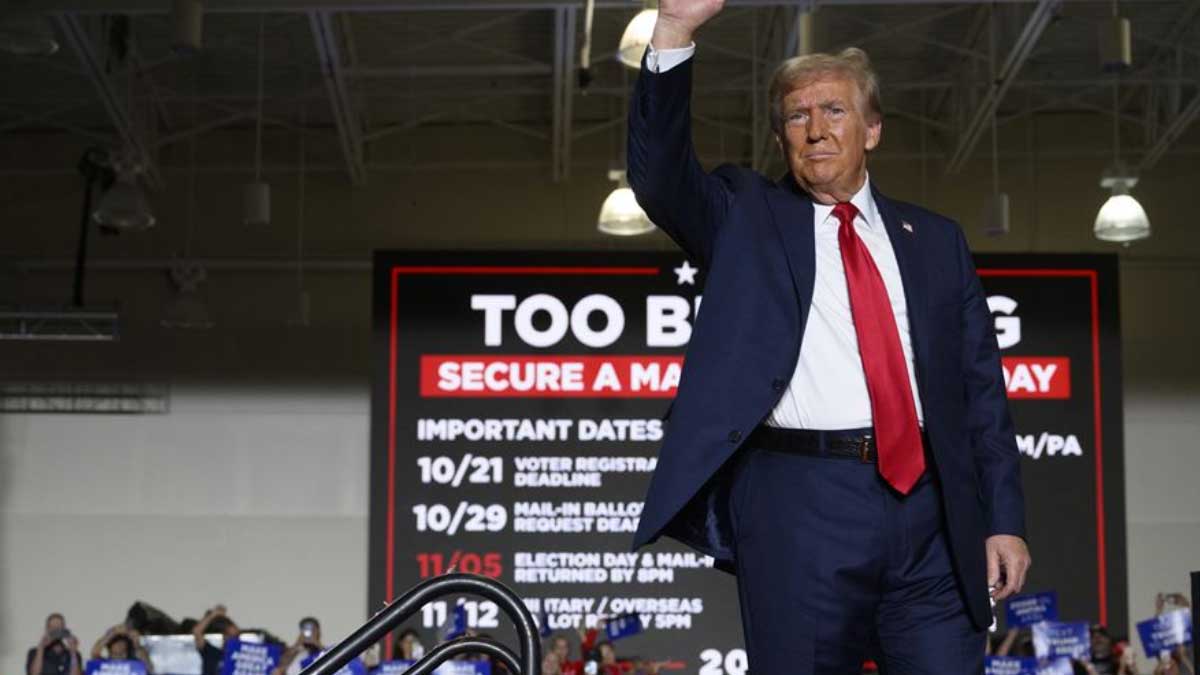- Home
- Billionaires
- Investing Newsletters
- 193CC 1000
- Article Layout 2
- Article Layout 3
- Article Layout 4
- Article Layout 5
- Article Layout 6
- Article Layout 7
- Article Layout 8
- Article Layout 9
- Article Layout 10
- Article Layout 11
- Article Layout 12
- Article Layout 13
- Article Layout 14
- Article Sidebar
- Post Format
- pages
- Archive Layouts
- Post Gallery
- Post Video Background
- Post Review
- Sponsored Post
- Leadership
- Business
- Money
- Small Business
- Innovation
- Shop
Recent Posts
Trump’s ‘Violent Day’ Idea Echoes ‘The Purge,’ Sparks Backlash

Former President Donald Trump sparked significant discussion on social media during a rally in Erie, Pennsylvania, on Sunday, when he suggested that “one really violent day” could be a solution to rising crime rates, specifically shoplifting. His comments quickly drew comparisons to the horror film franchise “The Purge,” which explores a dystopian scenario where all crime is legal for one night each year.
At the rally, Trump made a series of claims regarding crime, suggesting it is on the rise and attributing some of the blame to migrants. He stated that drugstores are increasingly forced to keep products behind glass to deter theft, and he accused the “liberal left” of undermining police efforts to address shoplifting. Trump painted a vivid picture of theft, claiming that people are walking out of stores with large items like air conditioners and refrigerators.
In his proposed solution, Trump suggested that allowing a “really violent day” or even “one rough hour, and I mean real rough” would lead to an immediate cessation of shoplifting incidents. He pointed to Rep. Mike Kelly, R-Pa., who was present at the rally, implying that he could oversee this “violent day.” Trump claimed that Kelly would instruct police not to intervene during this period, allowing thieves to take what they wanted.
The concept of a “purge” resonates with the premise of the film series, which began with “The Purge” in 2013. In the movies, the annual event allows all crime, including violent acts, to go unpunished for a single night, ostensibly resulting in a significant drop in crime rates throughout the rest of the year. The films also depict emergency services as being unavailable during the purge, which serves as a method of social control, disproportionately affecting marginalized communities. The most recent installment, “The Forever Purge,” incorporates themes of immigration and societal unrest, showing characters attempting to escape violent groups targeting them.
Trump’s rhetoric regarding the need for violence to combat crime is not entirely new. In fact, the connection between his language and “The Purge” franchise has been made before. During the 2016 campaign season, the third film, “The Purge: Election Year,” played off some of Trump’s political messaging. One advertisement mimicked a campaign commercial, featuring the tagline “I purge to keep my country great,” a phrase that echoed Trump’s own slogan, “Make America Great Again.” The fourth film, “The First Purge,” even used marketing strategies that parodied Trump’s campaign, including hats that resembled his signature red campaign merchandise but bore the film’s title.
The backlash to Trump’s remarks extends beyond comparisons to fictional violence. His comments about crime were also accompanied by a controversial statement regarding Vice President Kamala Harris. Trump reiterated an unfounded assertion that she was born “mentally impaired,” a claim that has drawn widespread condemnation from various quarters, including fellow Republicans. He stated, “Crooked Joe Biden became mentally impaired,” before labeling Harris as “lying Kamala Harris,” and suggesting her condition was inherent.
Republicans such as Sen. Lindsey Graham and Maryland Gov. Larry Hogan have publicly criticized Trump’s remarks, calling them disrespectful not only to Harris but also to individuals with actual mental disabilities. Hogan described Trump’s comments as “insulting” and urged a more respectful discourse.
The rally in Erie and the subsequent online reactions highlight a growing trend in political discourse where hyperbolic statements can provoke significant public backlash. The imagery evoked by Trump’s suggestion of a violent purge resonates with the anxieties many Americans feel about crime and public safety, yet it raises serious questions about the appropriateness and implications of such rhetoric.
Critics argue that framing violent solutions to societal problems oversimplifies complex issues and can lead to real-world consequences. The rhetoric surrounding crime, particularly in the context of marginalized communities, often misses the mark, failing to address the underlying socioeconomic factors that contribute to criminal behavior. Instead, it sensationalizes violence as a quick fix rather than promoting constructive dialogue and policy reform aimed at reducing crime through community engagement and support.
In conclusion, Trump’s comments at the Pennsylvania rally have reignited discussions about violence in politics, the responsibilities of leaders to promote healthy dialogue, and the power of media in shaping public perceptions. As social media users drew parallels to “The Purge,” the focus shifted from genuine discourse about crime rates and public safety to the sensationalism of violence, underscoring the challenges of navigating these discussions in today’s polarized political climate.
Recent Posts
Categories
- 193cc Digital Assets2
- 5G1
- Aerospace & Defense46
- AI37
- Arts3
- Banking & Insurance11
- Big Data3
- Billionaires449
- Boats & Planes1
- Business328
- Careers13
- Cars & Bikes76
- CEO Network1
- CFO Network17
- CHRO Network1
- CIO Network1
- Cloud10
- CMO Network18
- Commercial Real Estate7
- Consultant1
- Consumer Tech180
- CxO1
- Cybersecurity68
- Dining1
- Diversity, Equity & Inclusion4
- Education7
- Energy8
- Enterprise Tech29
- Events11
- Fintech1
- Food & Drink2
- Franchises1
- Freelance1
- Future Of Work2
- Games141
- GIG1
- Healthcare78
- Hollywood & Entertainment186
- Houses1
- Innovation42
- Investing2
- Investing Newsletters4
- Leadership65
- Lifestyle11
- Manufacturing1
- Markets20
- Media193
- Mobile phone1
- Money13
- Personal Finance2
- Policy567
- Real Estate1
- Research6
- Retail1
- Retirement1
- Small Business1
- SportsMoney33
- Style & Beauty1
- Success Income1
- Taxes2
- Travel10
- Uncategorized8
- Vices1
- Watches & Jewelry2
- world's billionaires418
Related Articles
Trump Moves $4B Stake in Truth Social Parent, Stock Drops 6%
Donald Trump recently transferred his 57% stake in Trump Media & Technology...
By 193cc Agency CouncilDecember 20, 2024House Rejects Trump-Backed Funding Bill, Shutdown Looms
The U.S. House of Representatives rejected a new government funding bill on...
By 193cc Agency CouncilDecember 20, 2024Trump Named Time’s Person of the Year for Second Time
On Thursday, Time magazine honored Donald Trump as its “Person of the...
By 193cc Agency CouncilDecember 12, 2024Meta Donates $1 Million to Trump’s Inaugural Fund
Meta, the parent company of Facebook and Instagram, has confirmed a $1...
By 193cc Agency CouncilDecember 12, 2024















Leave a comment